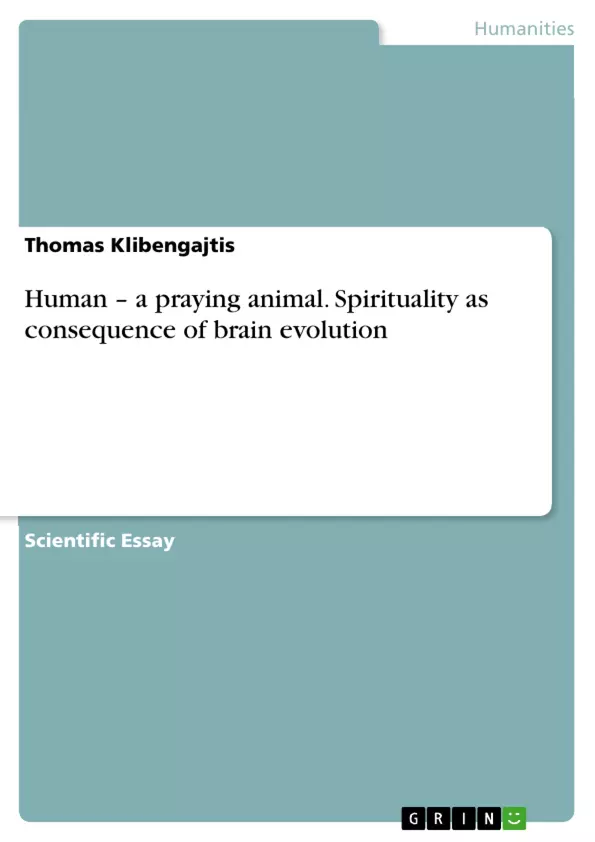The human uniqueness consists, from the biological point of view, in a complexity of brain, which enables humans to transcend their biological belonging to the world of evolution. This cerebral complexity allows us to develop the consciousness of self which results both in the fear of death and in the sense of transcendence together with its cultic consequences, such as prayer and offering, every religion consists of. By adopting the monistic perspective according to which “matter” and “spirit” are considered as two aspects of reality, not as two independent and incompatible substances, any problem to accept that biological evolution culminates in encephalization and spiritualization (Teilhard) will be resolved. In order to prove this thesis some hard proves from neurosciences and evolution will be adduced. Due to the recent brain research some neuronal correlates of different religious experiences can be detected. All these experiences involve brain areas (lateral prefrontal region, Brodmann’s areas 39 and 40 in the inferior parietal lobe in cooperation the cortico-striato-pallido-thalamocortical system) unique to the species homo sapiens. It seems that only humans are cerebral capable of transcendence, since God, guiding the evolution, wanted them to be “religious animals.”
Inhaltsverzeichnis (Table of Contents)
- Rationality and the clash of religions
- Scientific naturalism as the paradigm of today
- Philosophical background of scientific naturalism: the legacy of Descartes
Zielsetzung und Themenschwerpunkte (Objectives and Key Themes)
This text explores the relationship between rationality and religion, particularly in light of the contemporary scientific paradigm of scientific naturalism. It examines how different religious traditions have approached rationality and the role of God in understanding the world.
- The role of rationality in different religious traditions
- The impact of scientific naturalism on the understanding of reality
- The legacy of Descartes and the Cartesian split
- The influence of French philosophy on the development of the philosophy of science
- The relationship between metaphysics and scientific paradigms
Zusammenfassung der Kapitel (Chapter Summaries)
The first chapter discusses the concept of "religion" and how it applies to different worldviews, including secular, esoteric, and traditional religions. It also examines the relationship between rationality and religion, focusing on the different attitudes towards rationality within Christianity.
The second chapter delves into the challenges of connecting concepts like God, brain, prayer, and evolution within the context of scientific naturalism. It argues that the prevailing scientific paradigm often overlooks the role of metaphysics and social constructs in shaping scientific inquiry. It uses the example of the "dancing angels" problem to illustrate how scientific naturalism can restrict scientific exploration by rejecting metaphysical propositions.
The third chapter explores the philosophical roots of scientific naturalism, tracing its origins back to the Cartesian split of reality into "res extensa" (matter) and "res cogitans" (mind). It examines the development of dualism and its impact on the philosophy of science, focusing on the contributions of French philosophers like Voltaire, Diderot, and La Mettrie.
Schlüsselwörter (Keywords)
The main keywords of this text are: rationality, religion, scientific naturalism, metaphysics, Descartes, dualism, French philosophy, paradigm, social construct, and the relationship between mind and matter. The text explores the historical development of these concepts and their impact on understanding the relationship between religion and science.
Frequently Asked Questions
What is the "monistic perspective" mentioned in the text?
It is a view where "matter" and "spirit" are considered two aspects of the same reality, rather than independent substances. This helps resolve the conflict between biological evolution and spiritual experience.
How does brain evolution relate to spirituality?
The text suggests that the complexity of the human brain (encephalization) allows for self-consciousness and the sense of transcendence, making humans "religious animals" capable of prayer and cultic behavior.
What is scientific naturalism?
It is a paradigm that often rejects metaphysical propositions, focusing solely on observable natural phenomena. The text explores how this paradigm can sometimes overlook the role of God or spirituality in human understanding.
What was the "Cartesian split"?
Originating from René Descartes, it is the philosophical separation of reality into "res extensa" (matter) and "res cogitans" (mind/spirit), which has deeply influenced modern science and the dualism debate.
Are there specific brain areas linked to religious experiences?
Yes, neurosciences have identified neuronal correlates in areas like the lateral prefrontal region and parts of the parietal lobe that are unique to Homo sapiens and involved in spiritual experiences.
- Citation du texte
- Dr. Thomas Klibengajtis (Auteur), 2009, Human – a praying animal. Spirituality as consequence of brain evolution, Munich, GRIN Verlag, https://www.grin.com/document/190861



